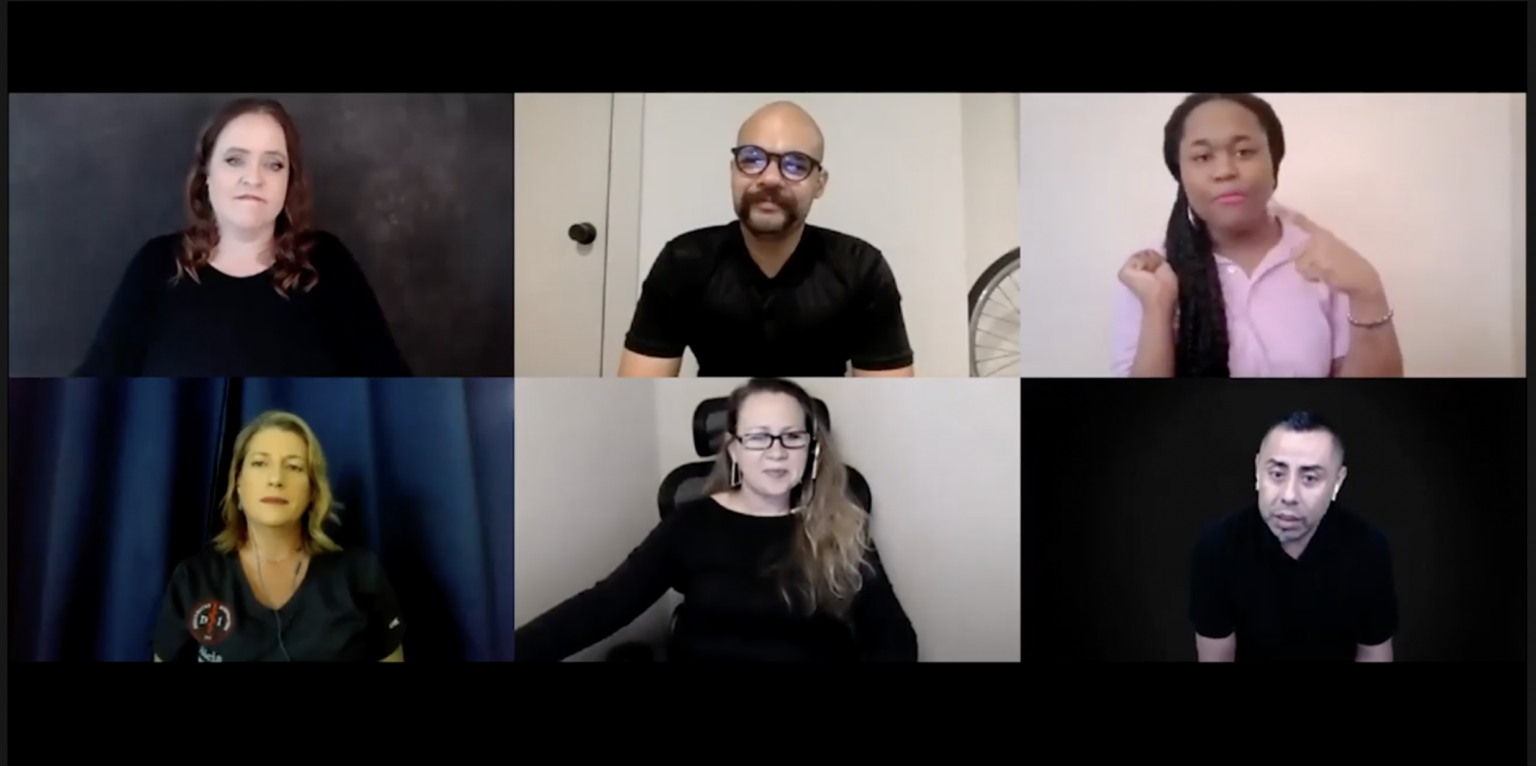Interpreting services cannot be provided in a vacuum. Sign language interpreters have a range of knowledge, skills, and backgrounds. Those varied qualifications must be matched appropriately to the job at hand and the deaf person must be included in every step of the process.
Those were the key lessons from Improve Access Through Interpreting, a live online discussion hosted by the National Deaf Center on Postsecondary Outcomes (NDC) on April 29th. Attendees had the opportunity to interact with a diverse group of experts, who shared their experience and knowledge.
The panelists were:
-
Alicia Booth: A sign language interpreter for 20 years, Booth founded Designated Interpreters, LLC, which provides niched, customized captioning and interpreting for deaf and hard of hearing medical students and professionals in healthcare.
-
Jermaine Williams: A schedule coordinator for Deaf Action Center in Dallas, Texas, Williams comes from a family of five generations of Deafness who taught him the importance of giving back to a community that has given so much to him.
-
Julia Kennedy: A deaf student at Hampton University and Gallaudet University who has cerebral palsy, Kennedy is also a blogger and public speaker. She is the first deaf student at Hampton, an HBCU, and wants to share her experiences with others who have similar challenges.
The Importance of Deaf-Centered Services
Each of the panelists began by emphasizing that achieving success is only possible when the interpreter selection is collaborative. Doing intake interviews, asking deaf students about their preferences, and finding out if these students have any additional needs are just a few examples of how institutions can work to become more deaf-centered and collaborative.
“We practice full empowerment of the deaf student by having them be involved in the selection of their interpreter using our designated interpreter pairing model,” said Booth, who works with deaf clients in medical training.
Institutions and programs who have never had a deaf student need guidance as well, Booth pointed out.
“We start from ground zero, doing some outreach and education with them,” she said. “Deaf people are not one size fit all. We explain to them the unique cultural values and distinct language needs.”
Keeping It Consistent: Preferred and Designated Interpreters
A poll asked deaf students if their school takes their preferred interpreters into consideration. While 52% of attendees answered yes, the other 48% answered “no” or “sometimes.” Nearly half of all respondents felt their voices weren’t being heard.
“Being the only deaf student at my university is challenging. I’m also a student with a disability, so I need to have interpreters who understand my signing style,” said Kennedy, emphasizing that her interpreter preferences answered a very specific need. “I want consistent interpreters, not a rotation of many different interpreters.”
Booth pointed out that knowing and advocating for yourself as a deaf student is important as well, “Designated interpreting is very much a partnership approach. It involves the deaf individual first understanding what their needs are.”
Williams agreed. While attending college, he knew his own needs while taking legal courses and advocated against using staff interpreters at the school. He felt their interpreting skills were not only substandard, but that they lacked the legal terminology needed to successfully interpret the class.
The university agreed to hire consistent interpreters from an agency that made a commitment to stay knowledgeable about the content in the class, rather than having staff interpreters cover the class.
Booth agreed with the need for consistent interpreting, saying that when the same team of interpreters works through a semester or course of study, they are prepared to manage any unexpected shifts and pivots that may happen. For example, a lecture on thoracotomy may change at the last minute to sickle cell anemia. A consistent team of interpreters can more easily make that shift.
“Prepare to be unprepared,” said Booth, “We as interpreters continue our self-study along with the client as they continue with their study. It’s a complete team approach.”
The Need for Qualified Interpreters
Williams also raised concerns about the lack of qualified interpreters and the impact of limited representation. He stressed that it is essential to be aware of the cultural components of interpreting, not merely the linguistic. “Part of being a qualified interpreter includes being prepared to code switch, especially when working with someone who identifies as Black, Indigenous, or a person of color,” he said.
Interpreters need to practice cultural humility and possess the competence to match the language of deaf consumers. Williams said students of color become exhausted from the labor of constantly code switching or adapting to other cultural norms, so he personally requests interpreters who are comfortable and skilled in it.
Kennedy agreed that schools need more diverse interpreters.
“I attend an HBCU, Historically Black College and University, and having a white interpreter with my group of black friends changes the dynamic,” she said. “My friends don’t feel as free to be themselves and have to measure their words carefully.”
Kennedy also underscored the importance of disability service providers working with students to be part of the solution as well.
“I have personal experience advocating and fighting for myself,” she said. “But it would be nice if the interpreters or the interpreter coordinators helped the deaf students in that fight and in that advocacy.”
The Bottom Line: Finding the Right Interpreter Benefits Everyone
“I encourage institutions, when they are looking at their bottom line, to not always just consider the cheapest route,” Booth said. “We have a lot of examples of legal cases where it ends up costing the institution a lot more money in the long run because due diligence wasn’t given to the process of hiring the appropriate interpreter.”
Williams mentioned that schools are often concerned with a perceived fiscal “burden” of hiring a larger interpreting team. While there are costs associated with interpreting services, he argues that it shouldn’t be the most important factor involved.
When a college he works with used a hearing and deaf interpreting team, for example, they saw success not only in increased pass rates, but also students excelling in competitive courses.
Providing interpreting services that are deaf-centered and consistent helps both students and institutions succeed.
More resources from NDC
To learn more, visit NDC’s online guide about interpreting and check out future online events and presentations.
Hundreds of other free resources are available. Sign up for NDC’s newsletter and listserv to stay updated on new events, resources, and classes. Contact NDC | help for additional questions or make an appointment with one of our specialists.









